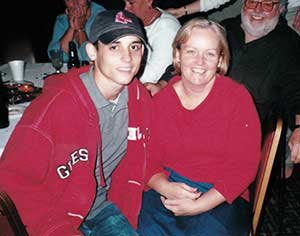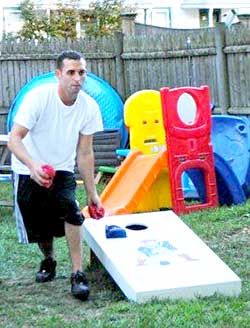
Ryan and Cathy Harrington.
By Mariya Manzhos
On Mother’s Day in 2010 Ryan Harrington, then 25, wrote in a card to his mother Cathy: “Wouldn’t it be the best present, if I were sober,” Ryan wrote. “I would love to give it to you.” That was all Cathy and her husband Dave wanted for Ryan, the baby in their family. Ryan’s 10-year battle with addiction to opioids included multiple recovery programs and even a stint in jail, but nothing worked long-term. “The pull was just too strong,” says Cathy.
After Ryan died of overdose in 2011, Cathy, Dave and their two other kids David and Eileen, knew they wanted to honor Ryan’s memory by helping their community in the fight against substance abuse. At the time, the opioid epidemic was escalating in Somerville and the Harringtons felt the need to speak out.
So in 2012 they started a non-profit, the Ryan Harrington Foundation, and committed to helping a younger generation resist the insidious pull of addiction and provide financial and emotional support to families on their journey to recovery.
“The stigma of addiction kept us somewhat quiet,” says Dave, admitting that people knew of Ryan’s passing, but the family didn’t publicize it. “But we saw an opportunity to help.” One of their hopes is to change the conversation around addiction, to talk about it openly as a debilitating disease. “What we’re doing now is trying to break that stigma of addiction and drug abuse,” says Dave.
From 2014 to 2015 opioid overdoses in Somerville spiked from 77 to 112, with about 14 being fatal in both years, according to Police and Fire 911 call data. The numbers aren’t conclusive and don’t include unreported overdoses, notes Patricia Contente, the Director of Community Outreach and Harm Reduction in the Somerville Police Department.
For their first fundraiser Ryan’s older brother David suggested organizing a corn toss tournament, the last game Ryan played with his brother on Labor Day before he died. “He wanted to do something different for Ryan,” says Cathy.

Ryan Harrington playing corn toss.
To the Harringtons’ surprise, the corn toss event grew bigger every year. In four years, the Foundation raised over $45,000 that went towards youth organizations in Somerville, such as YMCA, Somerville Recreation, Somerville Boxing, Youth Hockey, among others. Last Christmas Cathy also assembled gift bags with blankets and other necessities for women at New Day treatment center. Their event with the Celtics’ Chris Herren drew over 600 people. A team of dedicated volunteers, mostly friends and family, are the helping hands of Cathy and Dave. ”We’re lucky to have people,” says Cathy.
But perhaps the most important work that the Harringtons do happens behind the scenes – phone calls to detox centers, difficult conversations with those stricken by addiction and their family members, and lots of quiet support and listening.
When in March another family in Somerville lost their son Sean Curtis to addiction, Cathy and Dave offered to dedicate their upcoming 5K race fundraiser they had been planning to the memory of Sean. “We said to them – you can do as little or as much as you can,” says Dave. “As it turned out, we ended up with new friends that we’ll have for the rest of our lives.”
The boxes from the race are still stacked on the floor in the Harringtons’ spacious living room, waiting to be moved to storage. “This is our headquarters,” says Cathy of their home in Ten Hills.
The photos of Harringtons’ three kids, Ryan, David and Eileen adorn the walls. A side table and fireplace mantle serve as a makeshift memorial with Catholic crosses, angel figurines, photos of Ryan as a child, and a certificate of naming a star in Ryan’s memory.
“He had this beautiful smile,” says Cathy. “He was a jokester and class clown.” As a kid, Ryan’s skillful imitation of Pee-wee Herman’s voice was the highlight at Harrington family gatherings and had his kindergarten teachers bursting with laughter in class. “Everybody was his friend,” says Dave.
Cathy recalls starting to suspect something was off about Ryan, who was then a student at the Matignon High School. “He was irritated and agitated,” Cathy says. “You could tell.” She called his doctor and asked her to test Ryan for drugs when he’d show up for his physical. But at the appointment he refused to be seen and stormed out. Ryan started experimenting with Oxycontin on the weekends with friends, and eventually switched to heroin.
Every morning Cathy and Dave drove Ryan to school. “We’d watch him go in one door and leave in the other, when no one was looking.” says Cathy. His schoolwork plummeted, causing him to drop out his sophomore year.
The recovery was full of ups and downs. He was at the Cushing House in South Boston and other programs. He’d do well, and then relapse. He was in and out of the house. “But he would always come back,” says Cathy. “I called him ‘boomerang.’”
But even during his addiction, Ryan’s good nature didn’t disappear. When Ryan found out a neighbor was sleeping on the floor, he gave away his mattress and box spring.
A decade ago, many of the resources available today, organizations such as Learn to Cope and GRASP, didn’t exist yet or were only emerging. Cathy got advice from anyone she could – a social worker she knew at the Somerville Hospital detox center and her boss’s friend from the Rescue Mission. “We knew nothing about Narcan then,” says Cathy.
After one of the several overdoses, Dave was desperate to keep his son safe and called police on Ryan. “At that point it was the only way I knew,” says Dave. After spending six months in jail, Ryan returned home. “He seemed so good for a couple weeks,” says Dave. He used twice after coming back. The second time was fatal.
The pain of losing their child is with the Harringtons every day. “It doesn’t get easier, but you learn to live with it,” says Dave.
While more resources are emerging today, the biggest weakness of the system is the lack of support for long-term recovery, says the Somerville Police Department’s Contente. “After a 30-day treatment program in detox, there isn’t a continuum of support,” she says. Cathy and Dave agree.
“You need to build a facility that takes someone from detox and moves them to the next step – the CSS (Clinical Stabilization Service), then to the transitional house,” says Cathy.
While Somerville has made great strides in creating such a program, says Contente, in practice it still needs work. “The program isn’t stabilized yet, it’s still developing.”
Educating kids from an early age about substance abuse and the dangers of addiction is the most effective way to deal with the growing problem, Dave believes. “It’s not too early to talk to a kid at seven years old,” says Dave. “It’s like playing with matches. We need that rhetoric in schools.”
That evening the Harringtons were getting ready to head to a vigil in Everett in memory of addiction victims.
“That’s what everybody does – you support each other,” says Dave. “Because you need it.”















Reader Comments